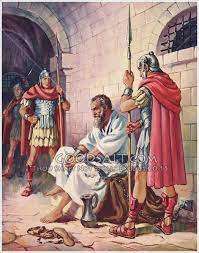
Christ Came to Fulfil the Law
Dr. George Cherian
The Word of God has always been under attack and more so these days. The evil one always attempts to destroy the foundation of faith. It is indeed a tragic sight to see many churches crumble spiritually and several beautiful church buildings now merely remaining as monuments of its glorious past. When Jesus entered into the religious world with the gospel of the kingdom of God, the people were surprised to note the authority in His teachings. They said, “What is this? What new doctrine is this?” (Mark 1:27) Jesus continuously hit at the empty traditions and hypocritical practices of the law. He knew that people hearing His interpretation of the scriptures may be tempted to belittle the authority and inspiration of the law. Although Jesus spoke many things about the scriptures, the most comprehensive teaching is found in the Sermon on the Mount. Jesus said, “Do not think that I came to destroy the Law or the Prophets. I did not come to destroy but to fulfil. For assuredly, I say to you, till heaven and earth pass away, one jot or one tittle will by no means pass from the law till all is fulfilled.” (Matt. 5:17, 18)
Jesus, Expositor of the Law
Jesus, first of all asserts the absolute authority of the law. The salient message we receive is its absolute authority. Amendment of law and constitutions is what we see all around the word. This is done to suit the time, situations and also due to the changes in the world view and thinking of the people. But the law of God remains complete and non-negotiable in its entirety. Jesus said, “One jot or one tittle shall in no way pass from the law, till all is fulfilled.” It is evident from the statement of Lord Jesus that partial and selective obedience is not conceivable to all who are subject to the law.
Jesus also spoke about the importance of keeping the spirit of the law. The religious world during the time of Jesus was very legalistic in keeping the traditions and the law. The rules regarding washing of hands, keeping the Sabbath, paying the tithes and such religious observances were precisely kept, yet they were void of reality and authenticity. This can be clearly seen in incidents where Christ exposes their hypocritical observances of the law. He said, “Woe to you, scribes and Pharisees, hypocrites! For you pay tithe of mint and anise and cumin, and have neglected the weightier matters of the law: justice and mercy and faith. These you ought to have done, without leaving the others undone.” Instead of pleasing the Lord the observances of the law was mostly done to satisfy themselves and also to please the outside world observing them.
Jesus also spoke of the severity of judgement in breaking even the smallest of the law. One can never overlook the many instances Jesus spoke about hell and eternal death. The law not only sets the absolute rule of life, it also speaks loudly of the judgement that it incurs for the unbelieving and disobedient.
Jesus, the One who fulfilled the Law
To anyone who has observed the life of Jesus, it is very evident that all that he did was done with the view of observing the law. As a little child He was brought to the temple, (Luke 2:23, 24) and when John the Baptist hesitated to give baptism, Jesus said, “Permit it to be so now, for this is fitting for us to fulfil all righteousness” (Matt. 3:15). As he began His ministry He went into the synagogue in Nazareth. After reading from the book of Isaiah, he said “today this scripture is fulfilled in your hearing” (Luke 4:21). The very life he lived fulfilled the scriptures and the sacrificial death of Jesus was the ultimate fulfilment of all the sacrifices and offerings ordained to the Old Testament believers through the Law of Moses as shadows of the things to come. When Jesus said, “It is finished.” It also meant that all things written in the Law of Moses and the prophets and the psalms were being fulfilled.
Throughout the history, human beings have failed to obey God’s commandment. When Joshua challenged the people to serve the Lord, they responded, “The LORD our God we will serve, and His voice we will obey!” (Joshua 24:24). But in reality all have failed in obeying the law and so Paul says, none are justified by keeping the law. But when God’s Son came into this world, He fulfilled the law in His earthly life. No wonder He could ask even His enemies, “Who can convict me of sin.” The silence of the enemies confirmed the innocence of Jesus. The Father in heaven said, “This is my beloved Son in whom I am well pleased.” Even Judas who betrayed the Lord said, “I have betrayed innocent blood.”
Jesus taught that the Law of Moses and the prophets can be summed up in two commandments. One, to Love the Lord your God with all your heart, with all your strength and all your mind, and also, love your neighbour as yourselves. Jesus illustrated with His own life how to love the Lord. He loved His Father, communed with Him always, and obeyed the Father even to the point of death. And His love for the neighbour was undeniably illustrated in giving up His life to save the world. Christ was the perfect man who fulfilled the law of God.
The Spirit of Christ helps us to fulfil the Law
Romans chapter seven reflects the heart of every person with the inner desire to do good and hence to comply with the law written in the hearts and scribed in the scriptures. Apostle Paul says that although one wants to do good, he is inclined to do the evil he hates. The conflict in the heart rises to a feverish pitch and Paul shares the heart cry of every person, “O wretched man that I am! Who will deliver me from the body of death?” (Rom. 7:24). Man is helpless in fulfilling the commandments of God.
Paul doesn’t leave us there sorrowful without an answer. He praises God by saying, “I thank God through Jesus Christ our Lord.” In these words of praise, Jesus, Christ and Lord, Paul spells out the secret of victorious life. Knowing Jesus as our Saviour gives us the righteousness, knowing Christ as the sanctifier gives us the practical righteousness and knowing Him as the Lord of our lives grant us the victory we need and desire in our life. A young Christian struggling for victory over a besetting sin realised that the problem lay in the fact that he was not willing to give up the habit. In desperation he began to pray, “Lord make me willing to be made willing.” In the days that followed he began to experience the grace of the spirit of Christ in his life and also victory in that area of his life. “For the law of the Spirit of life in Christ Jesus has made me free from the law of sin and death” (Rom. 8:2).
Christ, who endorsed the Law of Moses, expounded and explained the law, fulfilled the law, has also granted to those who are in Him the Spirit to fulfil it. Hallelujah, what a saviour!








